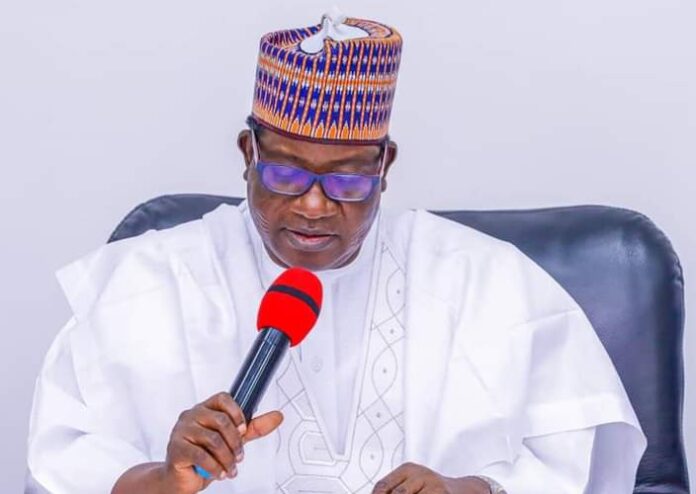Mr. Simon Lalong, Governor of Plateau State.
________________________________________
In the last seven weeks, over 35 people comprising male and female gender have reported one form of violence or the other to a non-governmental organization in the State, seeking intervention.
________________________________________
By Marie-Therese Nanlong
Jos – Domestic violence is not a new phenomenon. It has been supported by skewed religious/cultural beliefs that have become socially acceptable.
Many victims suffer in silence for fear of stigmatization, shame, and other things, but recently, the case of the late gospel artiste, Osinachi who allegedly lost her life due to domestic violence, has emboldened more people to speak up.
In Plateau State also, the death of 23 years old Mercy, whose stomach was allegedly ripped open by her husband about eight weeks ago has raised fresh advocacy for the culture of silence to be broken and for victims to seek help before it becomes late.
These recent incidents have nudged people to speak up as this medium’s findings reveal that in the last seven weeks, over 35 people comprising male and female gender have reported one form of violence or the other to a non-governmental organization in the State, seeking intervention.
The State Coordinator, National Human Rights Commission, Mrs. Grace Pam admitted, “There has been a tremendous increase in the number of domestic violence cases reported at NHRC Jos compared to what we had two years ago. From January 2022 to date, we have had about 288 cases.
“The increase can be attributed to a lot of factors among which are: unemployment, closely related to this is the economy. Others are cultural beliefs, substance abuse, witnessing family violence as a child, having low self-esteem, and a slow and ineffective legal process.
“Victims must seek help immediately from the family, the Police, NHRC, Ministry of Women Affairs, FIDA, and any response agency close to them to take up on the issue on their behalf.
“Victims must break the culture of silence and speak up, many have died trying to save the family name by not reporting, many have stayed back in abusive relationships because of the children and ended up dying and leaving the children behind to suffer, children too have lost their lives and so also house helps because of domestic violence.
READ : Group urges Plateau residents to safeguard peace
“Indeed, even men have lost their lives to domestic violence. There are devastating effects of domestic violence like disease, insanity, dropping out of school for children.”
Funmilayo Oloyede whose organization, Christian Women for Excellence and Empowerment in Nigeria Society, CWEENS receives between seven to 10 reports of domestic/gender-based violence in a week attributed the trend to many factors, saying “This often occurs between intimate partners, (husband and wife) there are times that one of the partners is a drunk. These things are real and the people tolerate them because of stigmatization and they now become a norm in society. People feel it is normal and they keep silent about it.
“These issues are on the increase daily, we can curb it by constant awareness and sensitization to the male and female gender because many people experiencing it end up being maimed or killed… Some violence comes as a result of economic pressure which makes spouses lash out unconsciously at each other and if that is not well managed, it escalates.”
She cautioned against religious/cultural teachings which subject people to stay in abusive relationships because “this is sending many people to early graves.”
Pastor Emmanuel Anosike who does not believe in divorce, also stated he does not support victims of domestic violence staying in abusive marriages because “there is room for separation to allow parties to sort out issues before coming back together.”
Survivors of domestic violence, Elizabeth Itse, and Hauwa Dakop agreed it is not advisable to endure domestic violence and asked victims to speak out.
Khadijat Usman who is not facing violence in her home, however, said, “My husband is not beating or abusing me, I think if any woman should face such, the bodily pain would be the problem but it is good for a husband to discipline an erring wife for the good of the children.”
But Jamilu Mazadu countered such a claim saying, “Islam teaches man to respect his family, reason with them, and be patient with them. This is captured in some Hadiths that reported the messenger of God (SAW) saying: The best of you are the best to their families, and I am the best to my family…The best of you are those who have the best manners…
“Give her (your family) food when you take food, clothe her when you clothe yourself, do not revile her face, and do not beat her…Furthermore, Islam allows an abused wife to claim compensation under ta’zir (discretionary corporal punishment). The 19th-century Syrian jurist Ib Abidin said ta’zir is mandatory for a:… man who beats his wife excessively and “breaks bone”, “burns skin”, or “blackens” or “bruises her skin.”
















